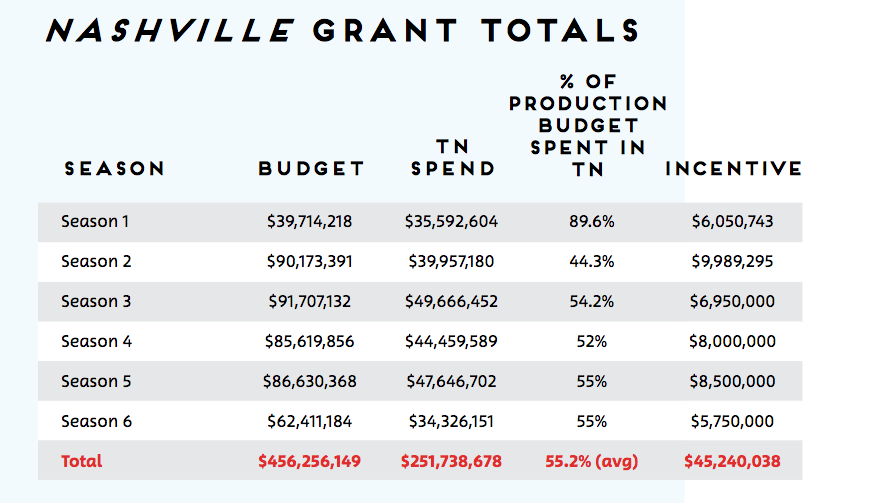As the sixth and final season of Nashville comes to a close on July 26, research organization the Beacon Center has released a report on the “ineffectiveness of film incentives in Tennessee,” citing that Nashville cost Tennessee taxpayers more than $45 million.
According to its profile, “The Beacon Center is an independent, nonprofit, and nonpartisan research organization dedicated to providing expert empirical research and timely free market solutions to public policy issues in Tennessee.”
Here’s what the Beacon’s new report had to say about Nashville, in part:
No project exemplifies the bad public policy of [movie production incentives, MPIs] in Tennessee more clearly than the ABC/CMT television show Nashville. The show, which has now been cancelled twice in three years due to poor ratings, has received the most taxpayer money of any project, totaling $45 million in state incentives alone (including millions more in local taxpayer incentives). Even worse, the show’s six seasons received the largest six individual Tennessee Entertainment Commission grants of any project in state history. The smallest incentive, $5.7 million given for the sixth and final season, was still awarded after CMT announced the show would be permanently cancelled. The show Nashville also serves as an example of how corporations or sports teams hold cities and states hostage after receiving taxpayer money. After the show’s second season, ABC producers explored moving filming to Austin, Texas, unless the show received more in Tennessee taxpayer incentives for the third season. However, this came immediately after less than 50 percent of season two’s budget was spent in Tennessee, a series low.

For a show named after a Tennessee city, outside of its first season Nashville was hardly dominating the Tennessee film industry. Also of note is that with the increased production budget after the first season, the percentage of expenditures that were qualified Tennessee expenditures dropped dramatically. The show also demonstrates that if a taxpayer-incentivized television show becomes even somewhat popular and scales up production and budget, the vast majority of a project’s growth will inevitably occur elsewhere, likely in Hollywood, where actors and actresses are more likely to reside and where support staff is easier to obtain. Thus, even a “successful” TV series will result in Tennessee taxpayers subsidizing Hollywood and other out of state locales. While fans may miss the show after it received its final death in July 2018, Tennessee taxpayers should breathe a sigh of financial relief.
Event though Nashville spent more than $251 million for goods and services in Tennessee over its six seasons, the Beacon is one entity that won’t miss Deacon, Juliette, Scarlett, Will and the rest of the gang.
photo by Jason Simanek







